In this post
What Does a Beautician or Beauty Therapist Do? Bringing Joy Through Beauty

As a beautician or beauty therapist, you’ll make your clients feel gorgeous from the outside in.
Beauty therapy is a varied and exciting field, but at its heart, it’s all about looking after and pampering people. Imagine healing someone’s acne scars with your skincare expertise, and giving them a huge confidence boost. Even a simple manicure could be the one nice thing a nurse does for themselves in a hectic week.
Ready for a fun, flexible and fulfilling beauty career? Today we’ll get an overview of the industry, answer your questions, and explain how you can start a career in beauty therapy.
What do beauticians and beauty therapists do?
Beauticians and beauty therapists perform a broad range of beauty services for their clients, including nail treatments, makeup, lash and brow treatments, hair removal, massage and body treatments, and facials. Generally, they will consult with clients to assess their needs, provide beauty advice and suggestions, and sell skincare and makeup products.
Tasks and responsibilities of a beauty therapist
This is a beauty therapist job description helping to answer the question of: What does a beauty therapist do?
- Consult with clients
- Conduct skin analyses
- Suggest beauty treatments and therapies
- Perform face and body treatments
- Educate clients and give advice
- Sell skincare and makeup products
You may also be required to perform some day-to-day business tasks, like:
- Answering phones and scheduling appointments
- Ordering and delivering supplies
- Record keeping for clients
- Cleaning treatment rooms and tools
The most important aspect of being a beauty therapist is to build trusting relationships with your clients. You will be in their personal space, so you need to have great interpersonal skills to ensure they feel comfortable.
What’s the difference between beauticians, beauty therapists and dermal therapists?
In Australia, we have beauty therapy career pathways for general beauty practitioners depending on their qualification. Here’s how we define each role and ways on how to become a beauty therapist, beautician or dermal therapist:
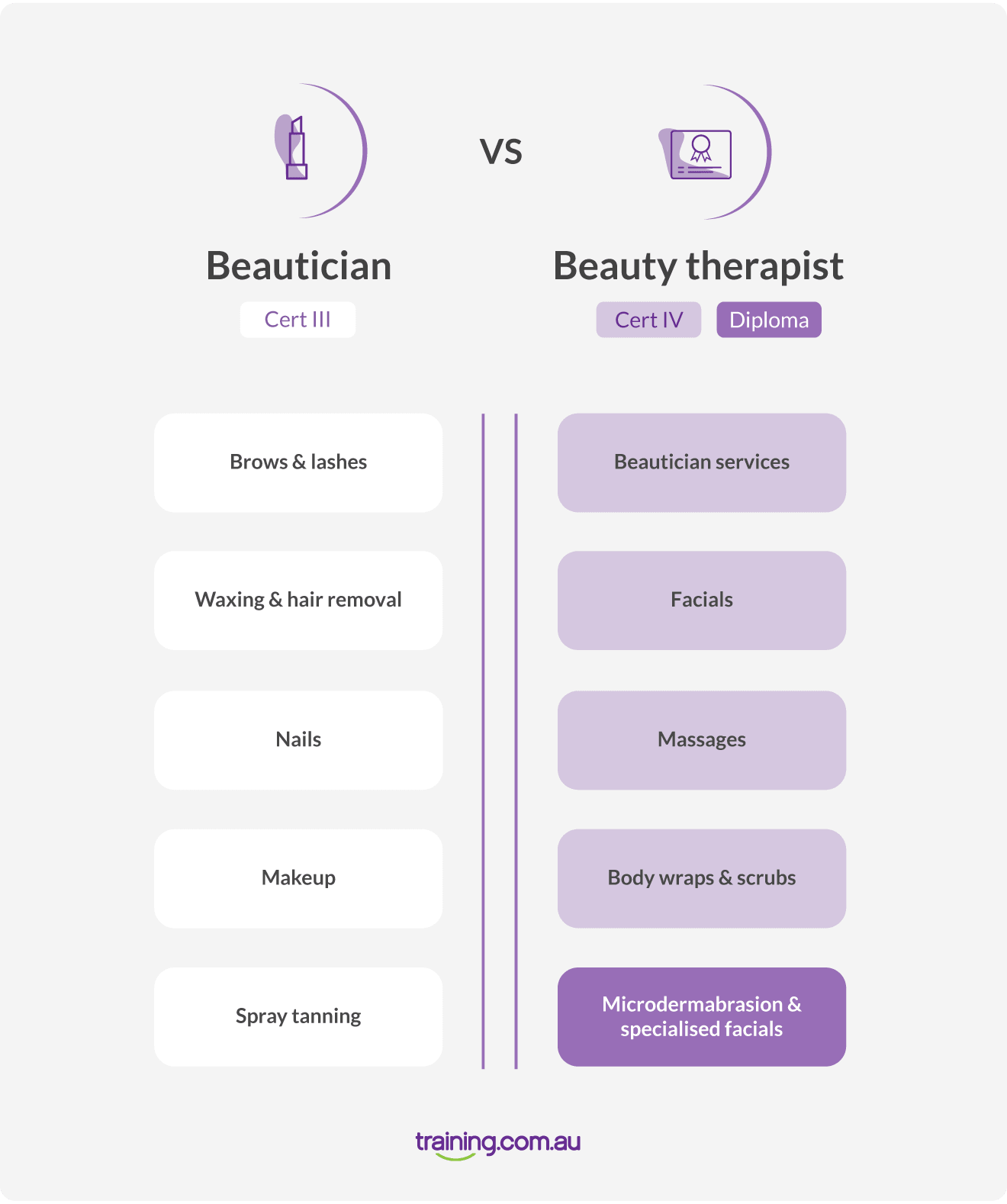
Beautician
Beauticians hold a Certificate III and can provide general beauty services like makeup, nails, lashes, brows, waxing and tanning.
Beauty therapist
Beauty therapists hold a certificate IV and can do everything a beautician can do, plus facials, massages, body wraps and scrubs.
Diploma-level beauty therapist
Diploma-level beauty therapists can also perform advanced facials like LED or oxygen infusions.
Dermal therapist
Dermal therapists have at least an advanced diploma and perform specialised skin treatments like laser, skin peels and micro-needling.
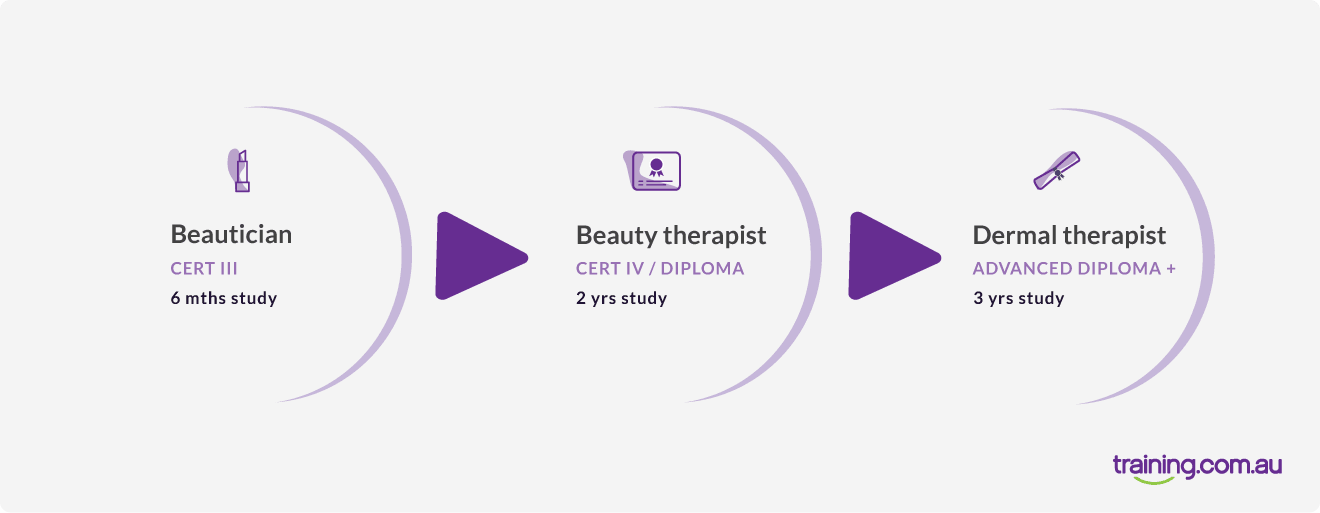
What is a beautician?
Beautician Qualification: Certificate III in Beauty Services
Beauticians perform beauty services such as lash extensions, manicures, brow and lash tints, tanning, hair removal, and simple skin treatments.
- The Australian equivalent of a cosmetologist in the US.
- No formal qualifications are required, but most hold a Certificate III.
- Often get qualified through an apprenticeship or traineeship.
Tasks and responsibilities:
- Hair removal and waxing
- Makeup application
- Spray tanning
- Eyelash & eyebrow tinting
- Lash extensions
- Manicures, pedicures and nail art
- Simple facials and massage (under supervision of a beauty therapist)
What is a beauty therapist?
In Australia, beauty therapists include anybody qualified with a Certificate IV or a Diploma of Beauty Therapy. The services they can provide depend on their level of qualification.
Beauty Therapist Qualification: Certificate IV in Beauty Therapy
Beauty therapists with a certificate IV can do everything a beautician can do, plus more. They can perform treatments you might find at a day spa, like facials, massages, and luxe body treatments like wraps and scrubs.
- The Australian equivalent to an esthetician in the US or aesthetician in the UK
- Trained in basic cosmetic chemistry
- Trained in skin anatomy and physiology
Certificate IV beauty therapists can perform beautician services, plus:
- Facials
- Massages
- Body wraps and scrubs
What is a diploma-qualified beauty therapist?
Beauty Therapist Qualification: Diploma of Beauty Therapy
Beauty therapists with diplomas are skincare specialists with an impressive array of facials at their disposal, providing advanced skincare treatments in beauty salons and spas. Their training enables them to carry out skin analysis, treat skin diseases and disorders such as acne, rosacea, and dermatitis, and help clients improve the appearance and feel of their skin.
- Skincare treatments
- Trained in skin anatomy and physiology
- Trained in cosmetic chemistry
- Can perform some of the same treatments as dermal therapists
Diploma-qualified beauty therapists can perform beauty therapy services, plus:
- Microdermabrasion
- High-frequency acne treatments
- Galvanic facials
- Microcurrent facials
- Sonophoresis facials
- LED facials
- Oxygen infusion facials
- Radiotherapy facials
- Ultrasound facials
What is a dermal therapist?
Dermal Therapist Qualification: Bachelor of Health Science (Dermal Therapies)
Dermal therapists hold either an advanced diploma, graduate diploma or a degree such as a Bachelor of Health Science (Dermal Therapies). Dermal therapists are experts in skin anatomy and physiology, skin conditions, and cosmetic chemistry. They can perform non-medical rejuvenation treatments, as well as operate lasers, skin needling, and non-surgical machinery. (Also known as dermal laser technicians, dermal clinicians).
- Usually work in medical settings, such as skin rejuvenation clinics or medi-spas
- Can, with further study, become Registered Nurses and administer injectables (such as Botox and dermal fillers) under doctor supervision
Can perform beauty therapy services, plus:
- Laser
- IPL (intermittent pulsed light)
- Skin peels
- Photorejuvenation
- Cosmetic tattooing
- Micro-needling
Why is beauty therapy a good career?
Beauty therapy is a rewarding career, perfect for people persons who love working hands-on. You’ll be helping clients improve their wellbeing every day, and be able to clearly see the positive effects of your work, which is super rewarding. You’ll also work in a close-knit team environment, building friendships and supporting one another along the way.
Plus, you’ll never get bored in the fast-moving beauty industry. With endless innovations and new beauty products hitting the market, you’ll continually find fresh trends and learn new skills.
Caring
You’ll bring a little bit of happiness to each client’s day. By listening closely to your client’s needs, you can help them find their own kind of beauty.
Results-oriented
Use your skills and abilities to achieve things. Since the results of your work are highly visible, you’ll feel a sense of accomplishment.
Scientific
Starting in beauty therapy offers many pathways into skincare and health sciences. You’ll gain the knowledge to make practical improvements to your client’s skin.
What is the job like?
These are the day-to-day working conditions you’ll experience in beauty therapy, so it’s a good idea to think about whether you’d be happy in this kind of environment.
- Talking to people face-to-face
- Touching people’s faces and bodies
- Working in a team
- Having freedom to make your own decisions
- Working indoors, in a temperature-controlled environment
Jane’s beauty career change: helping clients get their confidence back after cancer
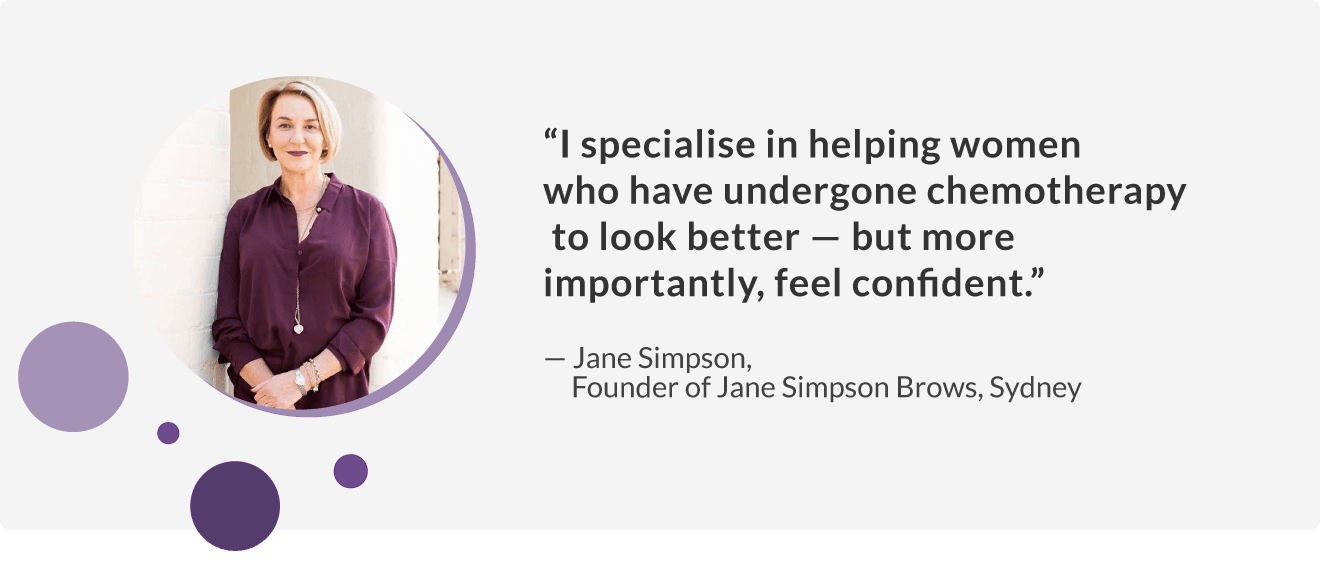
Leaving the corporate world for beauty
“In 2015, I left a successful career in the corporate world to begin my career in eyebrow microblading.
I needed to do something totally different from what I had been doing. I went from a grown-up corporate role to eyebrow microblading, and I was 50! Everyone thought I was mad to do so. But five years on, I have a wonderful life and business. I could not be happier, making women a happier version of themselves.
When I began the business, I wanted to rid the world of bad eyebrows, two at a time! That ideal lasted about one week when my first client, who had undergone chemo, saw herself in the mirror and burst into tears of joy.”
Giving women their confidence back after cancer
“I specialise in helping women who have undergone chemotherapy, who have alopecia, or who have lost their brows due to a myriad of other reasons to look better — but more importantly, feel confident.
They tell me that they can put a line under their cancer journey after having their eyebrows done. Many clients say, “I’m in remission, but every time I look in the mirror, I’m reminded that I have cancer because I have no eyebrows.”
Daily, I work with women who have been through the emotional and physical wringer with cancer treatments. Or who have lost their hair due to alopecia, in some cases, it all falls out in two weeks.
There is a common phrase to let the world know you’re having a bad day: you are having a “bad hair day”, your hair is bad, your day is bad. Imagine having no hair!
As women, our hair forms part of our identity. When there is no hair on our face, no eyebrows, it affects our self-esteem. These women are embarrassed to been seen without brows. They don’t go swimming or to the gym, and they dread summer as the drawn on brows melt off.
I give them beautiful, new, natural-looking eyebrows, but I also give them back their self-confidence, their freedom. I am empathetic and make them feel comfortable and happy. It is not an unusual sight to see a wig lying on my shelf and a beautiful bald woman lying on the treatment bed.
Some words of advice
“Make sure you have an absolute passion for what you want to do, that you want to do it and not just think it might fill in time, or someone else says you will be good at it. Ask local businesses in the same industry if they would let you spend time observing and getting a good feel for the career you think you want.
Whatever you choose to do, give it your absolute best and enjoy it – or there is no point in doing it.”
— Jane Simpson, Founder of Jane Simpson Brows in Sydney.
Career opportunities in the beauty industry
Beauty services is a broad umbrella. Because it’s so broad, there are many beauty therapy career pathways to transition into. Some beauty therapists are generalists and provide a wide range of services. Others choose to specialise in one area and make a name for themselves in that niche.
A popular career option for experienced senior beauty therapists is to start your own business, whether it’s a beauty salon, day spa, or an ultra-niche business like lash extensions or nail art.
Explore the types of beautician jobs and beauty therapist jobs.
Management career pathways
Clinic or salon manager
Lead your beauty team to success. Clinic or salon managers supervise the day-to-day operations of a beauty or hair salon, including managing staff and hair stylists, ordering stock and supplies, training, and budgeting. For this role, it’s useful to have a Diploma of Salon Management.
Specialisations
Nail technician
Add some professional polish, or just straight-up bedazzle your client’s nails. Nail technicians provide manicures and pedicures, apply artificial nails and sometimes nail art.
Lash technician
Amp up the glamour and specialise in luxe lashes. Lash technicians apply eyelash treatments such as lash tinting, perming, and lash extensions.
Spray tan artist
Get ready to make your clients glow. Spray tan artists apply spray tan to client’s bodies.
Makeup artist
Become a true artist of the face. Makeup artists apply makeup and educate customers on products and application.
Special effects makeup artist
Unleash your creativity and create wild transformations. Special Effects Makeup artists create special effects for TV, movies, photography and theatre.
Spa specialists
Dermal therapist / dermal laser technician / dermal clinician
Become an advanced skin expert. Dermal therapists and dermal laser technicians provide advanced technical skin treatments in a medical spa or medical setting.
Cosmetic nurse (registered)
Make next-level transformations happen for your clients. Cosmetic nurses are Registered Nurses that assist with medical cosmetic procedures such as dermal fillers, laser hair removal, and Botox.
Massage therapist
Go deeper into massage, the ultimate indulgence and stress-relief treatment. As a massage therapist, you’ll provide a much-needed respite from muscle tension and pain, and help people look after their bodies.
Retail
Beauty consultant (retail)
Become a beauty expert and guide, helping your clients pick the best products. Beauty consultants are salespeople and educators with extensive knowledge of cosmetics and skincare products. They may also apply makeup in-store.
Retail manager
The next level up from a beauty consultant, retail managers oversee the day-to-day operations of a beauty store or consignment stand in a department store, including staff performance and sales.
Where could I work as a beauty therapist?
Beauty salon
These establishments offer regular hours, the same location and regular clientele. You’ll be trained in all of the salon’s products and treatments and learn about any specialised electrical machinery they may have.
Day spa
Generally offer more specialised treatments, including the use of specialised machinery for body and hydrotherapy treatments. You’ll work with a combination of regular and temporary clients, and skills learned can be transferred anywhere in the world.
Tourist destination area
Work anywhere in the world, from a beachside resort to an eco-health retreat in the middle of a forest. Chances are your clients will be different every day, and you’ll be a long way from home.
Hotel
You’ll be offering the same treatments as found in day spas and salons, with the quality dependant on the hotel class. But often, the hours are unsocial, meaning you could be giving treatments at any time of the day or night.
Cruise ships
Hours are long, and there’s nowhere to go! However, you often get time off in port to explore the region, meaning you’ll experience some of the world’s most wondrous places. You’ll work under contract conditions, and there’s the potential for a high income if there’s a tipping culture onboard.
Home
A career as a beauty therapist also opens up the opportunity to be self-employed and work from home. Owning your own home-based business could significantly increase income potential, and you can set your hours.
While these aren’t the only options available to you, they are the most common. Your career could take you in many other directions, such as offering a mobile service, owning your own salon, temping for various beauty therapists, salon management, makeup artists on film sets, teaching at a college, becoming a sales rep for a company that sells beauty products, or writing for various beauty publications.
The opportunities to create a career to suit your particular needs and interests are endless. If you’re a single person who wants to travel the world or a family person with children who needs flexibility in their work hours, this career could be perfect for you.
Terri’s passion for skincare science led her to start a skincare line
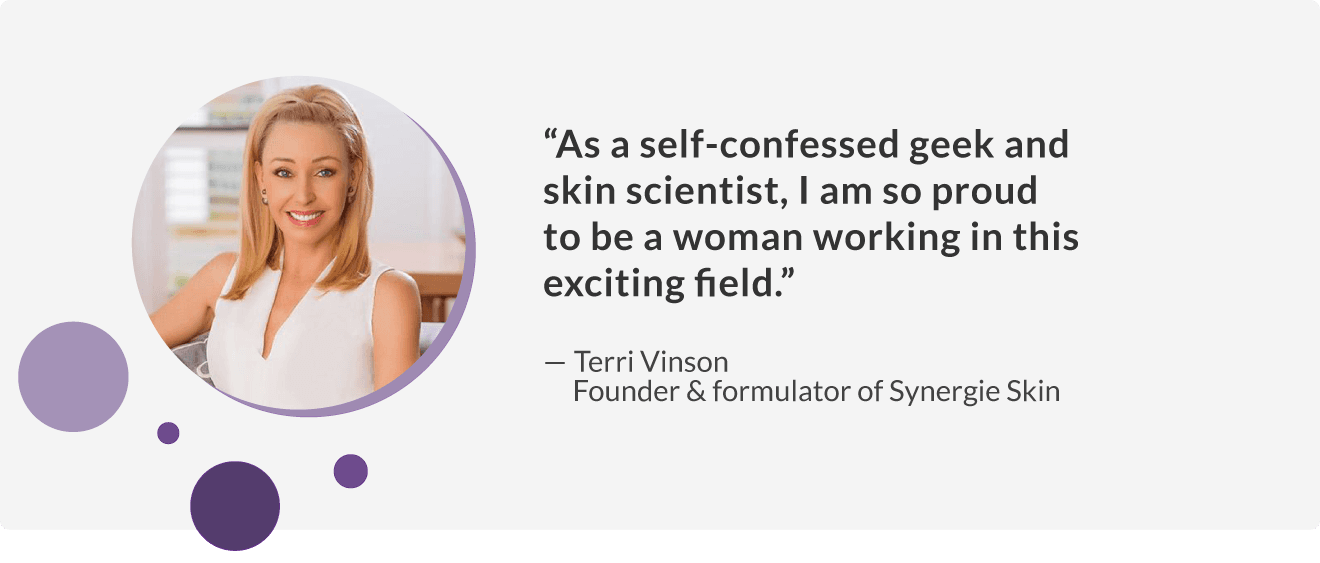
How Terri got into skincare science
“I was that awkward schoolgirl who spent hours a week poring over chemistry and biology books but was constantly urged to focus on other academic areas. But I refused to wear the ‘women don’t do science’ badge of the ‘70s!
Thankfully, my incredible dad, who passed away too early but is still that encouraging voice on my shoulder, was on my side and supported me in pursuing my passion for science.
I’m certainly no rocket scientist, but forty years later (eek!!), here I am. A cosmetic chemist living my dream of formulating skincare products that not only make a difference to the outside but can also boost confidence from the inside – and that’s why I get up in the morning.
To any young girl out there who wants to follow a path in science, I say unleash your inner nerd and go for it!”
Terri Vinson is the founder and formulator at Synergie Skin
Even more doors a beauty therapy career could open
The skills you learn working in beauty therapy are valuable and versatile, giving you entry pathways into many related disciplines.
Sales & account management
You find that you’re excelling in building client relationships and making sales. With the skills you learned as a beauty therapist, you pivot to client-facing sales and accounts roles which demand a high degree of personal service and immaculate personal presentation.
Healthcare
You find that your clients respond beautifully to your welcoming, nurturing manner. You might find that you enjoy the caring aspect so much that you’d like to pursue further study in nursing, counselling or allied health, and the skills you developed in beauty therapy make the perfect springboard.
Is beauty therapy right for me?
Apart from a passion for beauty and wellness, you’ll love this job if you’re helpful, love hands-on work and dealing with people from all walks of life. A creative eye certainly doesn’t hurt, either!
What can I earn as a beauty therapist?
Many individuals interested in this career ask the question: How much does a beauty therapist earn? On average, a full-time beauty therapist salary in Australia is $58,013 or $29.75/hr. In comparison, the average beautician salary is $38,146 per year in Australia or $31.82/hr.
Starting as an entry-level beautician, you can expect to earn around $21.75/hr. As you gain experience and develop your skills, your pay will step up too. The highest-paid beauty therapists earn around $67,000, or $38/hr.
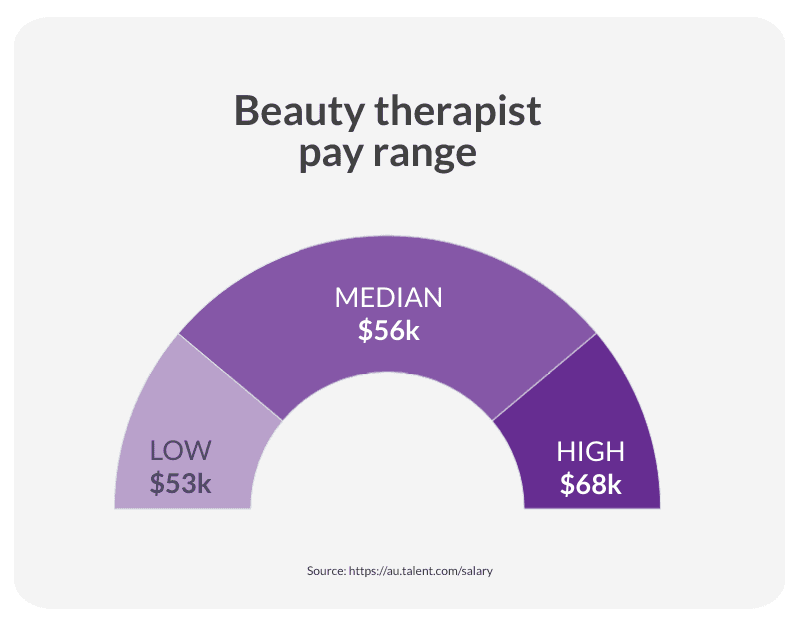
This is a great industry to get into if you’re looking for job security, as demand for workers is strong in the beauty services industry. Beauty therapy bounced back nicely after the initial impacts of COVID-19 lockdowns, making it into the government’s list of top ten rebounding occupations.
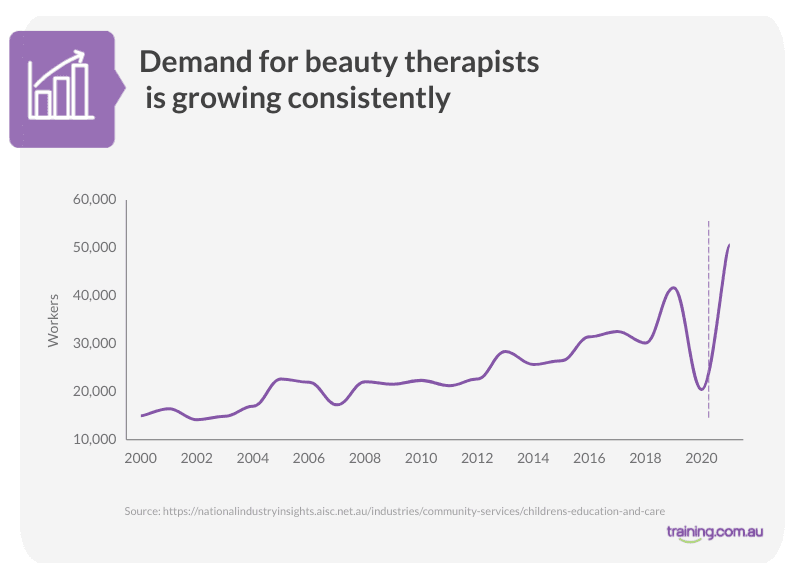
You may find this interesting: Beauty therapists in Brisbane, QLD, earn an average of 3.3% more than in other states.
Where is the beauty business going?
Enabled by the internet, social media and online communities, the balance of power has shifted. What was once a dictatorship from mass media to consumers is now a more democratic dialogue. We see more diverse images in beauty advertising and a much more comprehensive range of shades available in makeup products. So, after diversity, what’s next?
These trends have already become prevalent, reflecting changes in our society, and look likely to increase over the next few years. If you are interested in developing a business or a product line in the future, then here are some trends to keep an eye out for:
- Sustainability / organic niche
- Products and services focused on older people
- Babies and young children
- Men’s products and service
James sees beauty innovation as a chance to grow
“Working in the beauty industry has allowed me to follow my passion of bringing joy – both physically and emotionally – through skincare,” says James Vivian, Founder and Director at James Vivian in Toorak, Melbourne. “I realised this passion whilst studying beauty therapy – however, our industry is so diverse, allowing us to specialise or work generally across multiple specialties.”
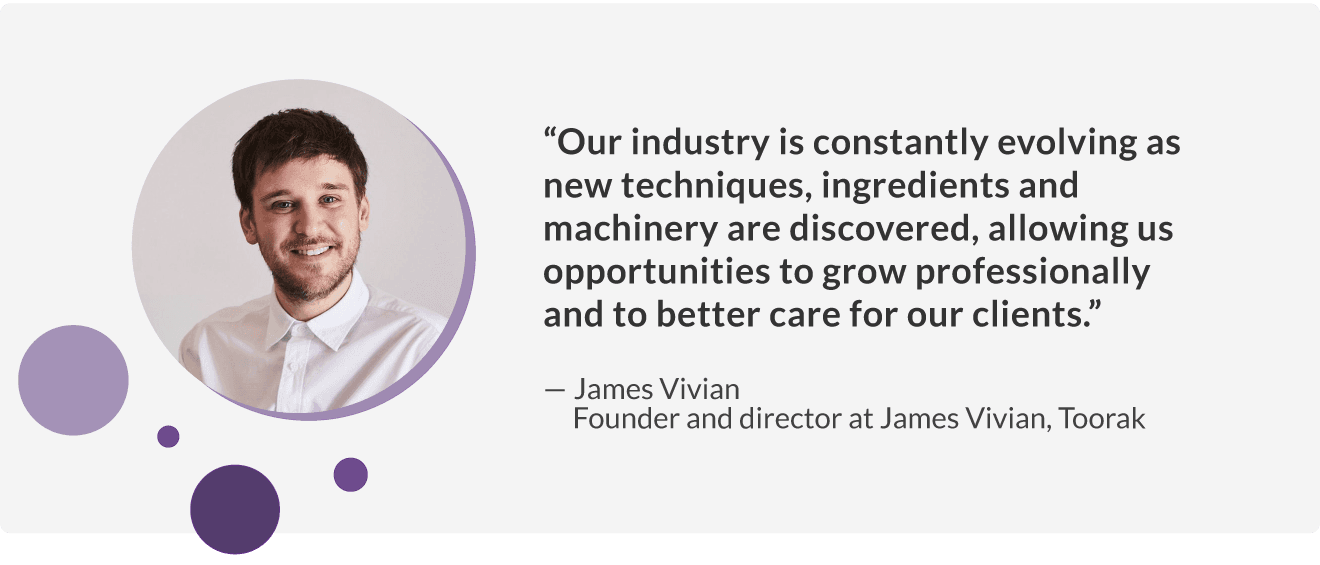
What skills do you need to be a beauty therapist?
If you’re interested in pursuing beauty therapy, chances are you already have many of the soft skills employers are looking for. Beauty therapy is a very people-focused job, so if you’ve ever worked in a customer-facing role, you’ll be able to hit the ground running in your first job.
Background knowledge of skincare science and beauty trends also goes a long way, so do as much of your research as you can.
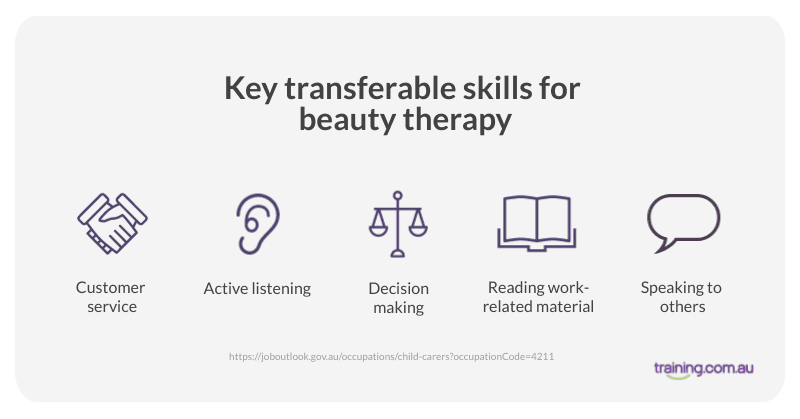
Key transferable skills include:
- Customer service — looking for ways to better help your clients.
- Active listening — paying careful attention to what people are saying.
- Decision-making — using your judgement and reasoning.
- Reading — keeping up with work-related reading material.
- Speaking — chatting with, educating, and selling to people.
How to become a beauty therapist
To work in beauty services, you’ll usually need a VET qualification in beauty. If you can find an apprenticeship or traineeship position, you can start learning on the job.
To become a beautician, you’ll need a Certificate III in Beauty Services. This usually takes around six months to complete, but there are also flexible online study options available so you can take it at your own pace.
To become a beauty therapist, you will need at least a Certificate IV in Beauty Therapy. Most beauty therapists have a Diploma of Beauty Therapy, which is the preferred qualification in the industry, and will often give you more job opportunities to choose from. That’s because you’ll be qualified to perform most of the treatments offered in day spas and skin clinics, including the full suite of body massages, aromatherapy massage, treatments and facials, and all cosmetic beauty treatments such as makeup, lashes, tanning, waxing and nails.
Beauty qualifications in Australia
Most beauty professionals get a VET qualification through a TAFE or a registered beauty school (RTO). Apprenticeships and traineeships are also popular ways to get qualified. Here are all the beauty qualifications available in Australia, sorted by qualification level.
- Short courses and certificates: You can also take quick, non-accredited, often online courses that train you for specific skills, such as eyelash extensions or nail art. Employers usually prefer accredited qualifications, however.
Certificate III Level
- Certificate III in Beauty Services ( SHB30115 ) – takes between 5 months-2 years – formally qualifies you to be a Beautician, Hair Removal Specialist, Makeup Artist, Manicurist, and Nail Technician.
- Certificate III in Nail Technology (SHB30315). Takes between 6 months – 47 weeks to complete. Qualifies you to be a Nail Technician.
- Certificate III in Make-Up (SHB30215) takes between 22wks – 2 years. Qualifies you to become a Professional Makeup Artist.
- Certificate III in Barbering (SHB30516) takes between 6mths – 3yrs. Focus on hair care and cutting. Qualifies you to become a Barber or Hairdresser.
Certificate IV Level
- Certificate IV in Beauty Therapy ( SHB40115 )
T takes between 9 months – 3 yrs. Formally qualifies you to be a beauty therapist or spa therapist, with the ability to perform facials and body treatments. - Certificate IV in Hairdressing (SHB40216)
It takes between 4 months – 1 year. Focus on cutting, styling and colouring. Qualifies you to become a hairdresser or barber.
Diploma Level
- Diploma of Beauty Therapy ( SHB50115 ) Most popular.
Takes between 46 weeks – 2.5 years. Formally qualifies you to be a beauty therapist capable of performing advanced facials and body treatments, a hair or beauty salon manager, or a makeup artist. Includes a salon placement to help you gain real-world experience and confidence. - Diploma of Salon Management (SHB50216)
It takes between 6 months – 1 year to complete. Qualifies you to become a hair or beauty salon manager, hairdresser, or barber.
Advanced Diploma Level
- Advanced Diploma of Intense Pulsed Light and Laser for Hair Reduction (SHB60118)
Qualifies you to become a laser hair removal specialist.
University Level
Experienced beauty therapists who want to deepen their knowledge will often get a degree-level qualification in dermal science.
- Bachelor of Health Science (Dermal Therapy) / Bachelor of Dermal Science
Qualifies you to become a dermal therapist working in medical and laser clinic settings. Usually takes three years to complete. - Graduate Diploma of Dermal Science (52854WA)
Qualifies you to become a dermal therapist working in medical and clinical settings. Usually takes ten months to complete, but you must have a relevant bachelor qualification to enter.
What is the highest beauty qualification?
A Graduate Diploma of Beauty Therapy is the highest beauty qualification in Australia and is equivalent to a Master’s-level study. You usually complete the Graduate Diploma after the Bachelor of Health Science (Dermal Therapies), a science degree specialising in human skin anatomy, physiology and chemistry. Completing the Diploma of Beauty Therapy will often function as an entry pathway into the Bachelor course, with your qualifications counting as credit toward completion.
Pursuing a career path in beauty therapies, you’ll discover opportunities to care for people’s wellbeing, express yourself creatively, and bring joy to people’s lives. You beauty!
Latest Articles
Agriculture Careers: What You Should Know in 2025
As one of Australia's most important industries, the agriculture industry offers great career opport...
Are Digital Skills the Key to Job Security in 2025?
The digital revolution is here, and it doesn’t care if you have a technical job or not — it’s coming...
How to Become a Chef in Australia: Complete Guide for 2025
The complete guide to becoming a chef in Australia. Learn how to get your start and make it in the h...
Want to read more?
The 10 Best Types of IT Jobs For You Based On Your Personality
Here is a complete guide to Careers in IT. Learn about the range of job titles and positions you can...
Best Cyber Security Certifications to Kickstart Your Career
A career in cyber security offers exciting opportunities. This is a dynamic ever-evolving industry w...
24 Most Fulfilling Jobs That Work With Kids: Which Is Your Calling?
Is working with kids your calling in life? Discover the 6 jobs working with children rated most fulf...

